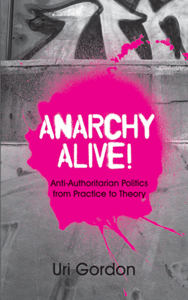 First edition cover | |
| Author | Uri Gordon |
|---|---|
| Subject | Anarchism |
| Genre | Political philosophy, sociology |
| Publisher | Pluto Press |
Publication date | November 2007 |
| Publication place | United Kingdom |
| Pages | 183 |
| ISBN | 0-7453-2683-8 |
| OCLC | 154769337 |
| 320.5/7 22 | |
| LC Class | HX833 .G626 2008 |
Anarchy Alive!: Anti-Authoritarian Politics from Practice to Theory is a book by Uri Gordon that investigates anarchist theory and practice. [1] An expanded reworking of the author's PhD thesis at the University of Oxford, the book was released by Pluto Press, a London-based radical publisher, in November 2007. [2] [3] It is presented as "an anarchist book about anarchism", [2] and assumes some background knowledge and sympathy for anarchism on the part of the reader. [4] Gordon considers his approach in the book to have many commonalities with that of anthropologist David Graeber, author of Fragments of an Anarchist Anthropology . [5]